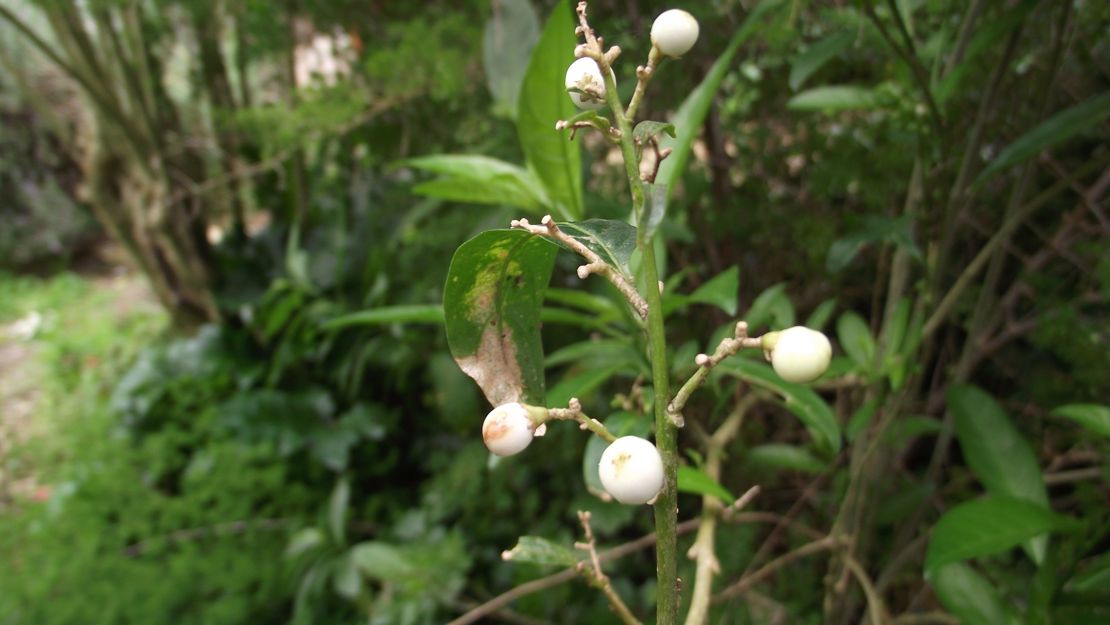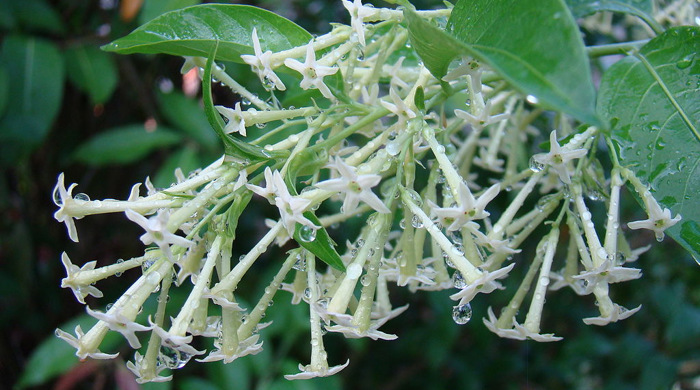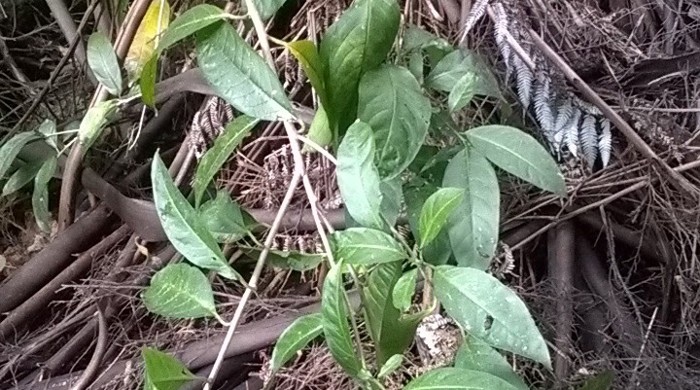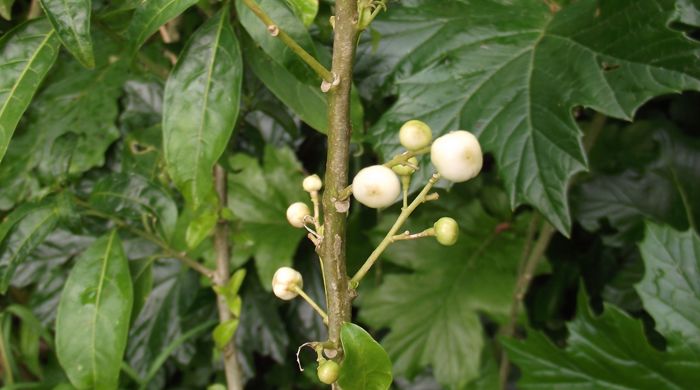Cestrum nocturnum
Queen of the night
Family: Solanaceae
Origin: South America

Regional Pest Management Plan (RPMP) status
- National Pest Plant Accord Species
- Whole region — Sustained control
General description
Perennial shrub < 2.5 m tall. Leaves are elliptic and < 15 x 6 cm. Flowers are tubular, < 2 cm long, pale green/white, nocturnally fragrant and borne in November – March. Fruit is a glossy white berry < 1 cm in diameter.
What you need to know
To help protect our environment:
- You must not breed, distribute, release or sell queen of the night. As queen of the night is a National Pest Plant Accord species, these restrictions apply within the Auckland region and across the whole of New Zealand.
- You must not plant queen of the night within the Auckland region, unless you are transferring an existing plant on your land to another location within the boundaries of the same property.
- You must destroy any queen of the night on land that you occupy if it has been planted in breach of the above rules and you are directed to do so by an authorised person.
Habitats
Scrub, riparian and forest margins, gardens, wasteland, sheltered gullies, light gaps, roadsides, coastal cliffs.
Dispersal
Seeds dispersed by birds. Vegetative spread from creeping roots. Human-mediated dispersal through dumping of garden waste, deliberate plantings.
Impact on environment
Forms dense stands, preventing recruitment of native vegetation. Poisonous and may cause hay-fever symptoms.
Control
Site management
Follow up treated areas 3 times per year. Encourage natural regeneration of native plants or replant treated areas where possible after 2-3 treatments to establish dense ground cover and minimise reinvasion.
Recommended approaches
Do not attempt to undertake control of this species on Aotea/Great Barrier Island group. Please report to Auckland Council if seen on Aotea/Great Barrier Island group.
Physical control
Method: Dig out
Plant parts requiring disposal: All parts
Disposal options: Remove to greenwaste or landfill if practical. Cut stems can resprout.
Biocontrol
Biocontrol is currently not available for this species.
Community agrichemical control recommendations
No qualifications: Cut stump and paste freshly cut base of stems with metsulfuron gel or ringbark stem and paste with metsulfuron gel.
Basic Growsafe certified: Cut stump and spray freshly cut base with 5g metsulfuron-methyl per 1 L of water.
Certified Handler/Experienced agrichemical user: Foliar spray seedlings with 5g metsulfuron-methyl per 10L of water and 20ml penetrant.
Safety notes
Poisonous to animals.
Caution: When using any herbicide or pesticide please read the label thoroughly to ensure that all instructions and safety requirements are followed.



System.ArgumentNullException: Value cannot be null. (Parameter 'mediaItem') at Umbraco.Extensions.ImageCropperTemplateCoreExtensions.GetCropUrl(IPublishedContent mediaItem, IImageUrlGenerator imageUrlGenerator, IPublishedValueFallback publishedValueFallback, IPublishedUrlProvider publishedUrlProvider, ImageCropperValue localCrops, Boolean localCropsOnly, Nullable`1 width, Nullable`1 height, String propertyAlias, String cropAlias, Nullable`1 quality, Nullable`1 imageCropMode, Nullable`1 imageCropAnchor, Boolean preferFocalPoint, Boolean useCropDimensions, Boolean cacheBuster, String furtherOptions, UrlMode urlMode) at Umbraco.Extensions.ImageCropperTemplateCoreExtensions.GetCropUrl(IPublishedContent mediaItem, IImageUrlGenerator imageUrlGenerator, IPublishedValueFallback publishedValueFallback, IPublishedUrlProvider publishedUrlProvider, Nullable`1 width, Nullable`1 height, String propertyAlias, String cropAlias, Nullable`1 quality, Nullable`1 imageCropMode, Nullable`1 imageCropAnchor, Boolean preferFocalPoint, Boolean useCropDimensions, Boolean cacheBuster, String furtherOptions, UrlMode urlMode) at AspNetCore.Views_MacroPartials_relatedSpecies.ExecuteAsync() in C:\home\site\wwwroot\Views\MacroPartials\relatedSpecies.cshtml:line 44 at Microsoft.AspNetCore.Mvc.Razor.RazorView.RenderPageCoreAsync(IRazorPage page, ViewContext context) at Microsoft.AspNetCore.Mvc.Razor.RazorView.RenderPageAsync(IRazorPage page, ViewContext context, Boolean invokeViewStarts) at Microsoft.AspNetCore.Mvc.Razor.RazorView.RenderAsync(ViewContext context) at Microsoft.AspNetCore.Mvc.ViewComponents.ViewViewComponentResult.ExecuteAsync(ViewComponentContext context) at Umbraco.Cms.Web.Common.Macros.PartialViewMacroEngine.Execute(MacroModel macro, IPublishedContent content) at Umbraco.Cms.Web.Common.Macros.MacroRenderer.ExecuteProfileMacroWithErrorWrapper(MacroModel macro, String msgIn, Func`1 getMacroContent, Func`1 msgErr) at Umbraco.Cms.Web.Common.Macros.MacroRenderer.ExecuteMacroWithErrorWrapper(MacroModel macro, String msgIn, String msgOut, Func`1 getMacroContent, Func`1 msgErr) at Umbraco.Cms.Web.Common.Macros.MacroRenderer.ExecuteMacroOfType(MacroModel model, IPublishedContent content) at Umbraco.Cms.Web.Common.Macros.MacroRenderer.RenderAsync(MacroModel macro, IPublishedContent content) at Umbraco.Cms.Web.Common.Macros.MacroRenderer.RenderAsync(String macroAlias, IPublishedContent content, IDictionary`2 macroParams) at Umbraco.Cms.Core.Templates.UmbracoComponentRenderer.RenderMacroAsync(IPublishedContent content, String alias, IDictionary`2 parameters) at Umbraco.Cms.Core.Templates.UmbracoComponentRenderer.RenderMacroAsync(Int32 contentId, String alias, IDictionary`2 parameters) at Umbraco.Cms.Web.Common.UmbracoHelper.RenderMacroAsync(String alias, IDictionary`2 parameters) at AspNetCore.Views_Partials_grid_editors_macro.ExecuteAsync() in C:\home\site\wwwroot\Views\Partials\grid\editors\macro.cshtml:line 13 at Microsoft.AspNetCore.Mvc.Razor.RazorView.RenderPageCoreAsync(IRazorPage page, ViewContext context) at Microsoft.AspNetCore.Mvc.Razor.RazorView.RenderPageAsync(IRazorPage page, ViewContext context, Boolean invokeViewStarts) at Microsoft.AspNetCore.Mvc.Razor.RazorView.RenderAsync(ViewContext context) at Microsoft.AspNetCore.Mvc.ViewFeatures.HtmlHelper.RenderPartialCoreAsync(String partialViewName, Object model, ViewDataDictionary viewData, TextWriter writer) at Microsoft.AspNetCore.Mvc.ViewFeatures.HtmlHelper.PartialAsync(String partialViewName, Object model, ViewDataDictionary viewData) at AspNetCore.Views_Partials_grid_editors_base.ExecuteAsync() in C:\home\site\wwwroot\Views\Partials\grid\editors\base.cshtml:line 6



